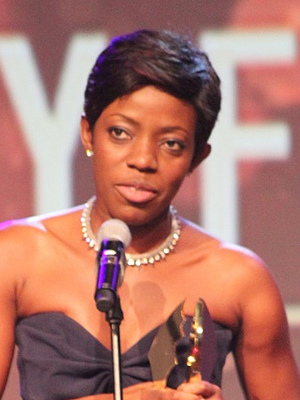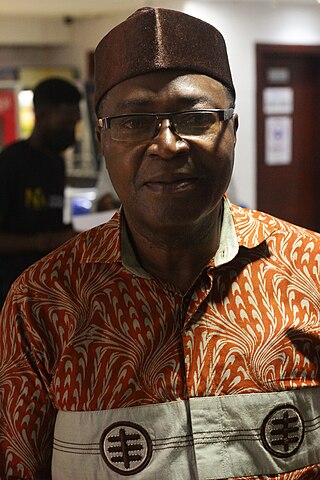There are many styles of traditional and modern music of Ghana, due to Ghana's worldwide geographic position on the African continent.

The Akyem are an Akan people. The term Akyem is used to describe a group of four states: Asante Akyem, Akyem Abuakwa, Akyem Kotoku, and Akyem Bosome. These nations are located primarily in the eastern region in south Ghana. The term is also used to describe the general area where the Akyem ethnic group clusters. The Akyem ethnic group make up between 3-4 percent of Ghana's population depending on how one defines the group and are very prominent in all aspects of Ghanaian life. The Akyem are a matrilineal people. The history of this ethnic group is that of brave warriors who managed to create a thriving often influential and relatively independent state within modern-day Ghana. When one talks of Ghanaian history, there is often mention of The Big Six. These were six individuals who played a big role in the independence of Ghana. Of the big six, people of Akyem descent made up the majority.
Alexander kofi Adu, is originally from the Ashanti Region of Ghana but lived in a suburb in Accra Newtown called Asantewaa, also known as Agya Koo. He is an actor and comedian from Ghana. He is a very renowned kumawood actor and has appeared in over 200 Ghanaian movies including Obaatanpa, Away Bus, Black Star, and Ma Tricki Wo.

Shirley Frimpong-Manso is a Ghanaian film director, writer, and producer. She is the founder and CEO of Sparrow Productions, a film, television and advertising production company. She won Best Director at the 6th Africa Movie Academy Awards. Frimpong-Manso is also a principal of Sparrow Station, a video streaming service for African entertainment from Sparrow and other African film producers. In 2013, she was ranked the 48th most influential person in Ghana according to E.tv Ghana.

Woyaya is the second album by Ghanaian Afro-rock band Osibisa released in 1971 by MCA. It was reissued in 2004 in a two-CD pack together with the self-titled album Osibisa by BGO Records.
Akwasi or Kwasí or Kwesi is an Ashanti masculine given name originating from the Ashanti people and their Ashanti day naming system, meaning born on a Sunday. People born on particular days are supposed to exhibit the characteristics or attributes and philosophy, associated with the days. Akwasi has the appellation Bodua or Obueakwan meaning agility. Thus, males named Akwasi are supposed to be agile by nature.
Nana Kwame Ampadu was a Ghanaian musician and composer credited with numerous popular highlife tracks and he is known to have composed over 800 songs. He was also known as Adwomtofo Nyinaa hempɔn. Ampadu was the lead singer, chief songwriter, and founder of the "African Brothers Band". He is regarded as a pioneer of highlife and afrobeat music and one of the most illustrious Ghanaian musicians of the 20th century.

David Kwame Dontoh and affectionately called Uncle David, "Ghanaman" and "Kofi Abranteɛ", is a veteran Ghanaian actor and television personality who has starred in numerous local and international films, drama, theatre, and other stage productions. He has been very influential in the development of television and drama, especially during the golden age of theatre in Ghana in the 80s and 90s. He took up acting in 1980 after seeing a National Film and Television Institute (NAFTI) newspaper advert inviting potential actors to come forward for training in stage and film acting. His first NAFTI film was The Way To Shame, a short seven minute stage production which was directed by Alex Bannerman as part of his formal assessment in drama production. Alex who was a student of NAFTI at the time had chanced upon David and persuaded him to play the lead role as the intended person had not showed up during shooting. The film's assessment panel, especially Mike Hagan, recognised David's potential in theatre and drama and highlighted this to the young Alex Bannerman. Subsequently, David's acting potential became more noticed when he played the lead role in Gus: The Theatre Cat, a short stage adaptation of a poem by T. S. Eliot. The play was directed by George Andoh Wilson of Wilson Acting Academy fame.
Grace Omaboe, popularly known as Maame Dokono, is a Ghanaian actress, singer and television personality. She ran the former Peace and Love Orphanage which is now Graceful Grace school in Accra. Omaboe and others were honoured by the organisers of 3Music Awards for her achievement in the entertainment industry in Ghana.
Phyllis M. Christian is a Ghanaian lawyer and consultant who has been called "one of the most influential women in Ghana". A lawyer by training, she is also the founder, chief executive officer and managing consultant of ShawbellConsulting, based in Accra. Her maternal grandfather George Alfred Grant, popularly known as Paa Grant, was one of the founding fathers of Ghana.
Checkmate is a Ghanaian crime drama film that was written and directed by Shirley Frimpong Manso for Sparrow Productions. It was produced by Ken Attoh, features stars like Nadia Buari, Ekow Blankson, Naa Ashorkor Mensah Doku and introduced Senanu Gbedawo. It was released in 2010.

Kumawood is a privately owned movie and awards company that is based in Kumasi, Ghana. It was founded by Samuel Kwabena Darko, a Ghanaian businessman and entrepreneur.
Asonaba Kwaku Darko popularly known as Super OD was a Ghanaian comic actor and a performer who featured in the popular Akan drama TV series, Osofo Dadzie and movies like Diabolo.
Obra (Life) was a Ghanaian television drama series which was very popular in Ghana in the 1980s.
Edward Kofi Donkor (1942–1995) was a Ghanaian highlife musician. He was popularly referred to as Senior Eddie Donkor or Eddie Donkor Senior.
Frimpong Manso also known as Osofo Dadzie, was a Ghanaian veteran actor and producer who was the lead character on Osofo Dadzie, a Ghanaian television drama series between 1970 and 1993. He died on August 10, 2020, aged 89.
Samuel Kwesi Oppong popularly known in the theatre industry and among fans as was a Ghanaian ace actor, musician and storyteller. Oppong maintained his trademark sideburns which set him apart from his fellow actors. Aside from acting, he was also an accomplished guitarist and band leader and had been in the music business since the 1950s. He composed, sang and recorded several hi-life songs during his time as a professional musician. He founded the SK Oppong Guitar Band which toured the country and played at some of the most famous venues. The group found modest success on Ghana's music scene from around 1959 with hi-life songs like "Obaa Kunadu", "Akwankwaa Hiani", "Kyere Me Ade a Meye", among others.
Rose Akua Attaa Mensah is a Ghanaian actress who is best known as Kyeiwaa for her role in the Film Kyeiwaa.
Charles Allen Gyimah (1939–2014) was a Ghanaian traditional leader, politician, film maker, and entrepreneur. He was the founder of Video City Limited, a video production company which was situated in Accra and Mampong.





